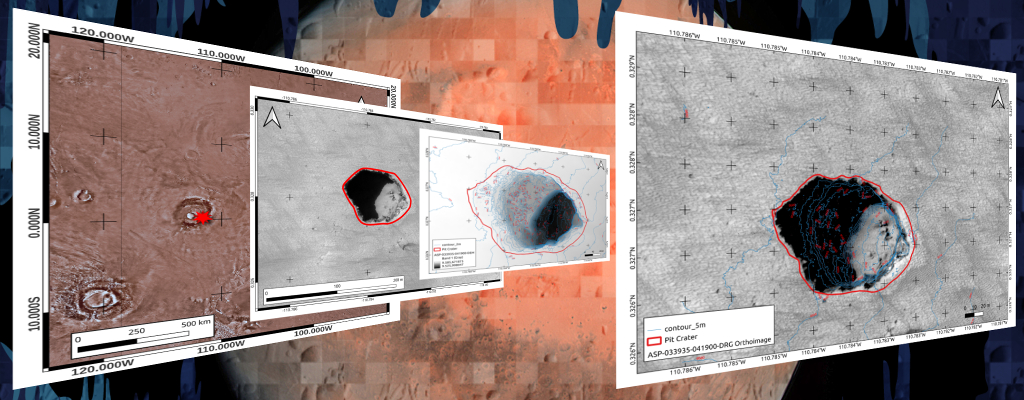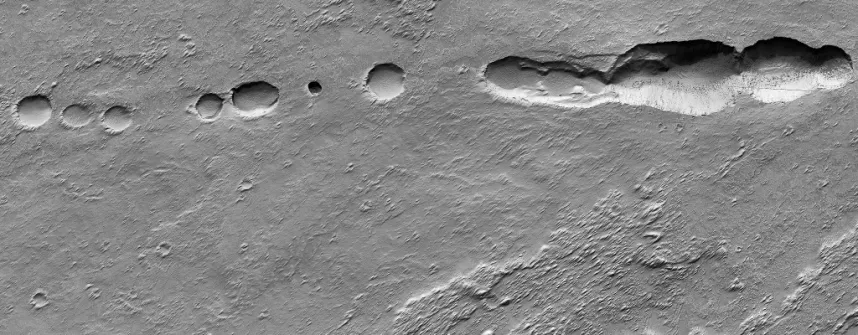Researchers develop AI method for mapping planets
Examples of Martian pit landforms possibly connected to caves. (Source: NASA/JPL-Caltech/UArizona/PDS Geosciences Node's Orbital Data Explorer for Mars Data Access)
Can the mapping of planets become an automated process? Scientists from Constructor University in Bremen, Germany, the University of Padua, and the University of Bologna have now developed a novel, open-source approach for the mapping of planetary landforms using artificial intelligence. "DeepLandforms," the pre-release version of the deep learning program was published in the American Geophysical Union journal “Earth and Space Science” at the end of December.
Creating geological maps of planetary surfaces such as Mars is a complex process. From data collection to data analysis to publication in different formats – the production of maps is based on a time-consuming, multi-step process. Deep Learning techniques, which use artificial neural networks to analyze data sets, can significantly improve the production process, as broadly shown in both scientific literature and applications. However, until now, open-source, ready-to-use, and highly customizable toolsets for planetary mapping were never released.
"We were interested in designing a simple, out-of-the-box tool that can be customized and used by many," said Giacomo Nodjoumi. The PhD candidate in the research group of Angelo Rossi, Professor of Earth and Planetary Science at Constructor University, was key to developing "DeepLandforms.” The program is open and available for further optimization, and showcases an inexpensive, fast, and simple approach to mapping planets in outer space.
The scientists demonstrated the results that can be achieved with the help of the software for planetary mapping with a specific landform on Mars, which resembles lava tubes on Earth. Geological maps are an important tool in planetary exploration, because they also serve as a basis for possible explorations by robots or humans.

Example steps from initial large-scale detection to semi-final geomorphological map of a pit near Pavonis Mons, Mars. (Source: NASA/JPL-Caltech/UArizona/PDS Geosciences Node's Orbital Data Explorer for Mars Data Access)
Link to Article:
DeepLandforms: A Deep Learning Computer Vision toolset applied
to a prime use case for mapping planetary skylights
Questions answered by:
Angelo Pio Rossi | Professor of Earth and Planetary Science
anrossi@constructor.university
About Constructor University and Constructor group:
An international community, vibrant and diverse. Offering academic excellence, ensuring the highest standards in research and teaching. Empowering students to solve the world’s pressing challenges through knowledge and science: Constructor University is a top-ranked, English-speaking, private university. Founded in 2001, it provides a wide range of 25+ academic programs and PhD. The Constructor ecosystem comprises the university, located in Bremen, Germany and an institute in Schaffhausen, Switzerland.
Over 1.800 students from more than 110 nations on campus benefit from a unique interdisciplinary, foundational theoretical and practical education. Enriched with a buzzing entrepreneurial culture that prepares young professionals to thrive in the job market. With 6.000+ alumni worldwide our community keeps growing – with our highest cohort ever registered in 2022.
The research-centric faculty projects are funded by the German Research Foundation and the European Union's Framework Program for Research and Innovation as well as by globally leading companies.
Constructor University benefits from partnerships with high-ranked universities such as Carnegie Mellon, the University of Geneva or the National University of Singapore School of Computing, and technology companies such as Anisoprint, JetBrains and ChemDiv.
The Constructor ecosystem is a global institution dedicated to addressing the main challenges of the world through science, education, and technology. Apart from the University, the ecosystem relies on several for-profit entities that provide technology infrastructures and solutions, life-long education programs, consulting services, and funding: Alemira by Constructor, Rolos by Constructor, Constructor Learning and Constructor Capital.
